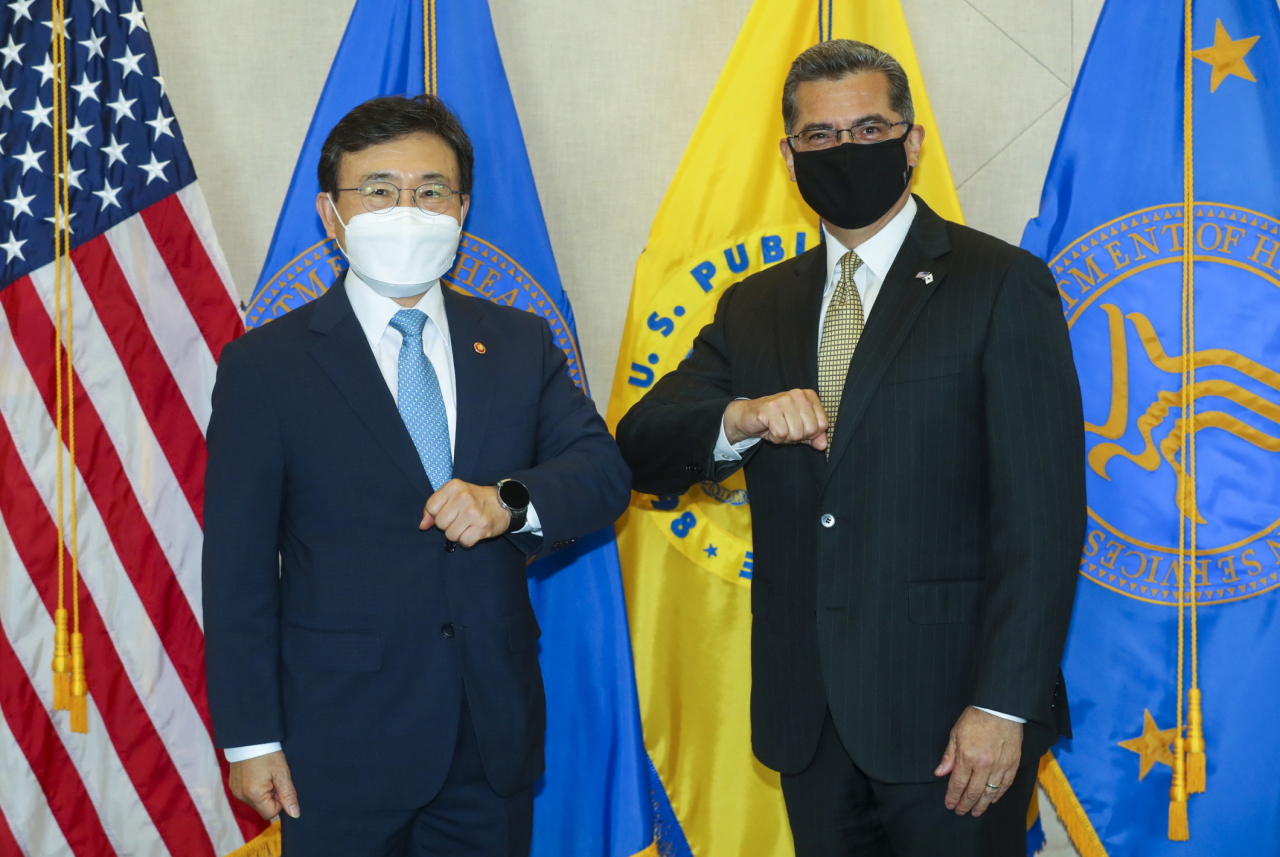
Photo shows South Korean Minister of Health and Welfare Kwon Deok-cheol (left) and US Secretary of Health and Human Services Xavier Becerra (Ministry of Health and Welfare)
South Korea, through a newfound partnership with the US, is expected to assume a bigger presence in the global supply chain of COVID-19 vaccines, the Ministry of Health and Welfare said Sunday.
No concrete plans have been revealed on how this will stabilize the supply of vaccines in Korea.
The announcement comes after President Moon Jae-in and the US President Joe Biden agreed on a “comprehensive partnership” on COVID-19 vaccines Friday. Moon went into the summit under pressure to bring US-made vaccines home faster amid a slow rollout and a resurgence in infections.
“President Moon Jae-in’s visit to the White House has further strengthened the Korea-US alliance on COVID-19 vaccines,” Minister of Health and Welfare Kwon Deok-cheol was quoted as saying in Washington. The vaccine alliance aimed to “assist the world in defeating COVID-19 through an expedited production and supply of vaccines.”
Kwon said he and US Health and Human Services Secretary Xavier Becerra “recognized the importance and urgency of tackling vaccine supply to overcome the pandemic” in a meeting Friday, and that to that end, “Korea will be consolidating its place as the world’s vaccine powerhouse” and “play a crucial role in easing a global shortage in vaccines.”
The minister said Korea has also promised to expand its role in Global Health Security Agenda, a pandemic preparedness initiative, to which the country will be contributing $200 million over the next five years.
Samsung Biologics entered into a deal with Moderna on Saturday to provide fill-and-finish manufacturing and product packaging of its COVID-19 vaccine in Korea. The Korean company will handle the final stage in the manufacturing process -- putting the bulk vaccine into vials and packaging them up for distribution.
Korea has secured 40 million doses of Moderna’s vaccine, which was granted approval here Friday, becoming one of four vaccines greenlighted in the country along with those from AstraZeneca, Pfizer and Johnson & Johnson.
Jung Eun-young, who heads the ministry’s COVID-19 vaccine introduction task force which launched in April, told Sunday’s briefing that Moderna’s new deal with Samsung Biologics meant “Korea is now equipped with the basis for making mRNA vaccines for the first time,” and that it was “expected to help the country secure mRNA vaccines in the long run.”
The fill and finish of “hundreds of millions of doses” of Moderna’s vaccine will be taking place in Korea from August at the earliest, she said. But how many of those will be distributed locally was “still being negotiated.”
When asked how the vaccine partnership with the US will improve Korea’s own vaccine rollout in terms of speeding up the delivery timeline or expanding access to supply, Jung said, “Korea has already locked in enough vaccines for 192 million people. The vaccines will be brought here with no fathomable delays, and as such we will be getting to herd immunity by November’s end.”
She added that SK bioscience, through a February deal, is licensed to manufacture 40 million doses of Novavax’s protein-based vaccine candidate for Korea. The two companies also have an arrangement for a technology transfer that excludes the Matrix-M adjuvant, a key component of the vaccine candidate.
As for the 550,000 Korean soldiers, for whom the US will be providing vaccinations, it was not yet known which vaccine they will be receiving and when, she said.
Joint research efforts into the mRNA technology with the US National Institute of Allergy and Infectious Diseases may also be on the horizon, she said.
“The US agency has the expertise into the mRNA platform, which is a vital tool in developing vaccines and treatments against new infectious diseases such as COVID-19. Research collaborations and talent exchanges with our own National Institute of Health could help us acquire the technology.”
Dr. Paik Soon-young, a virologist at Catholic University of Korea, said it was unclear from the announcements so far how the vaccine agreements at the summit will be an asset to Korea’s own vaccination campaign. He said that Korea, with only 3 percent of its population fully vaccinated to date, was struggling to make progress in face of shortages and other hurdles.
“Korea was supposed to have received at least some of its Moderna vaccine doses in the second quarter. August is already months late. And Novavax said it won’t be filing an authorization request in the US until June,” he said.
“More negotiations are probably underway, Korea’s vaccine drive is unlikely to see a boost as a result of the summit.”
Still, having any of the vaccine-manufacturing facilities in Korea is “significant,” said infectious disease professor Dr. Kim Woo-joo of Korea University. “The fill and finish manufacturing deal with Moderna is probably the most meaningful takeaway from the summit,” he said.
By Kim Arin (
arin@heraldcorp.com)



![[Herald Interview] 'Amid aging population, Korea to invite more young professionals from overseas'](http://res.heraldm.com/phpwas/restmb_idxmake.php?idx=645&simg=/content/image/2024/04/24/20240424050844_0.jpg&u=20240424200058)


